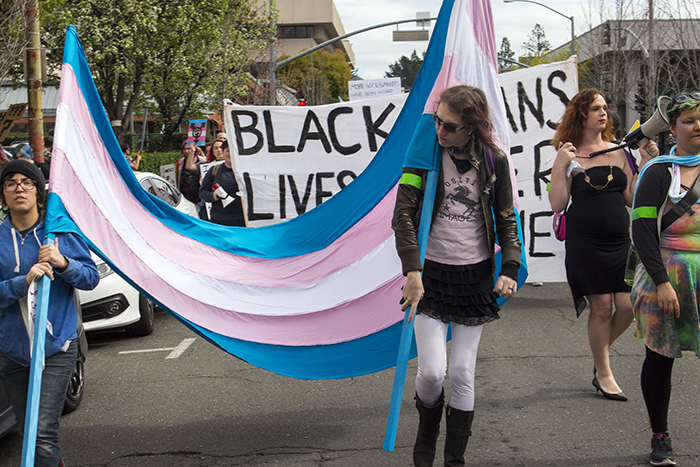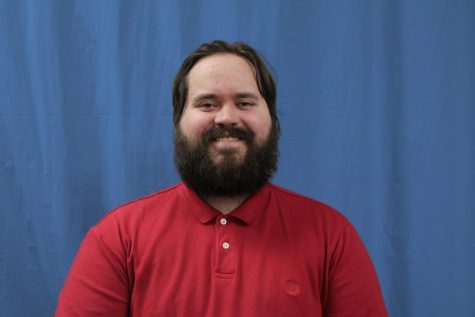Santa Rosa’s transgender community is stepping into the light, demanding basic human rights. The minority group is one of the most vulnerable in the United States and many believe its members will experience increased difficulties under the presidency of Donald Trump.
One setback for the transgender community came a month after Trump took office. Federal guidelines regarding transgender students’ right to use the bathroom of their choice were rolled back. As a response to the policy change, hundreds of people took to the streets March 18 in downtown Santa Rosa to show support for transgender students and youth.
“We raise awareness in the Sonoma County area about transgender rights for students and I feel like it was a very powerful demonstration,” said Jasmine De La Torre, protest organizer and Santa Rosa Junior College alumnus. “We have to stand up for our rights because right now we are being attacked. They are attacking our youth, who are very vulnerable and are our future.”
Trump’s political policies cause distress in an already oppressed community. According to the 2011 National Transgender Discrimination Survey (NTDS), 78 percent of transgender or gender non-conforming people reported harassment while in grades K-12. Forty percent of gender-expansive youth said they were often or frequently excluded by their peers, according to the Human Rights Campaign. The NTDS survey also found that 90 percent of transgender people experienced harassment in the workplace and one in four said they lost their jobs because they were transgender or gender non-conforming.
Furthermore, transgender and other gender non-conforming people in the United States attempt suicide at nearly ten times the rate of the overall population, according to a 2014 survey by the Williams Institute at UCLA.
At least 22 fatally violent incidents against transgender people occurred 2016 in the United States. According to the Human Rights Campaign, there have been at least eight transgender victims of fatal violence so far this year.
Ariel Erskine, an SRJC public relations department staff member, spoke about her own experiences as a trans woman during the Santa Rosa rally. While she believes SRJC had a slow start in its support of transgender students, she now appreciates the school’s efforts.
“One positive of the discourse and the attack on our rights on the national level is that places like the junior college have really stepped up to try to set a more progressive and inclusive environment,” Erskine said. “They are making a lot of efforts to change bathroom signage to be all-gender, thus removing the issues of what bathroom to use, or if you happen to be non-binary trying to [choose] between two signs neither which apply for you, now there are bathrooms with the appropriate signage for everybody to use.”
She added, “it can seem like a small thing to those who have not had to think about what bathroom to use, but for the transgender community it is a big deal and goes a long way to normalize and make us feel safe.”
SRJC President Dr. Frank Chong did not participate in the Santa Rosa rally, but said he cannot stress enough how important it is to him that transgender students feel welcomed at SRJC.
“We want to make sure transgender students feel safe here,” Chong said. “Having grown up in New York City and worked in San Francisco and the Bay Area, the LGBTQ community is one that I’m very close to… I think the honest truth is that the intolerance, ignorance and lack of exposure they receive are often due to our lack of knowledge. The transgender community is coming out of the shadows, and we have a lot to learn.”
Chong said he is content with SRJC’s support for transgender students. He works together with the President’s Advisory Committee with issues on how to make the college more welcoming to people within the LGBTQ community.
“One of the things we are very proud of is that we have been very proactive in terms of accommodation in restrooms. We have been working together with the LGBTQ community trying to support them after the attacks from President Trump,” Chong said. “I wrote an e-mail to the community which basically reaffirmed our support for anti-discrimination and the right for people to choose to use the bathroom of their choice.”
Chong encourages people to come up with ways to make transgender students feel included on campus.
SRJC student Kaiya Kramer, host of Calistoga’s KBBF 89.1 FM Radio’s show “The Queer Life,” is not satisfied with the school’s efforts to include transgender students in the college community.
“The JC making visible, vocal and active statements saying they are in support is, on the superficial and simple sense if it, a good thing,” Kramer said. “But there needs to be more action. If you want to be an ally, be an ally, don’t just say that.”
Kramer does not believe the gender-neutral bathrooms at SRJC are enough.
“People who are gender non-conforming, gender queer or rejection of the binary people are going to appreciate that [the gender-neutral bathrooms] a whole lot more, because these are people who necessarily are not comfortable with the binary bathrooms set up pretty much everywhere. It doesn’t help me as much though, as a binary trans woman of color.”
Kramer explains how guiding transgender students to use specific gender-neutral bathrooms could come with a risk.
“The gender-neutral bathrooms are supposed to be for everybody to go to, but those of us who are trans and are trying to not necessarily draw attention to our trans status are doing so by just going to gender-neutral bathrooms. Drawing attention to ourselves comes with potential danger.”
Kramer points to the coffee chain Starbucks and their effort to make all their bathrooms gender neutral in order to level the playing field.
“That is something I see is an option for SRJC too,” she said. “Another thing, perhaps easier for the JC, is to make strong statements that trans people are welcome in the bathroom that they identify with. Most of us who exist along the gender-binary want to use the bathrooms everybody else are using.”
Kramer would also like to see staff members at SRJC receive training on the issues of transgender students.
“Talk about how to interact with trans people and what language to use,” Kramer said. “Tell teachers to ask, at the beginning of a class, for everybody to go around and ask what the others’ preferred gender pronouns are. That would be a simple thing. There needs to be an understanding of what the pronouns are, the difference expressions and identities and how to be supportive.”
Kramer believes Trump is letting the transgender community down by removing federal protections on the basis of gender identity and sexual orientation.
“President Trump has definitely taken a strong stance against the trans and larger LGBTQQIAA community which is contrary to the beginning when he said that he was a friend. But actions speak louder than words,” Kramer said. “He is waging war against a minority group which has no room to protect itself.”
Kramer was not able to participate in the Santa Rosa march for transgender students’ rights. Although she appreciated that hundreds of people spoke up and showed support during the Santa Rosa rally, she said it is important for transgender activists to remember to work hard even when they are not in the spotlight.
“Marches have their place in terms of increasing visibility and awareness, but at the end of the day when people have marched, they go home and that is not what makes changes,” Kramer said. “What makes change in this world is calling your representatives, working at non-profits, doing volunteer work and consistent boring activism—which is what I consider a lot of the work I do on a daily basis.”
Kramer encourages SRJC students and others who question their gender identity or sexual orientation to reach out and get help.
“There is plenty of help. There is a crisis hotline that you can just call and there are mental health professionals trained in gender identity,” Kramer said. “And for you allies, it’s not the queer community that needs to act, it’s all of you. Our allies are the most important. Please be an ally, be active and make strong actions of support.”



